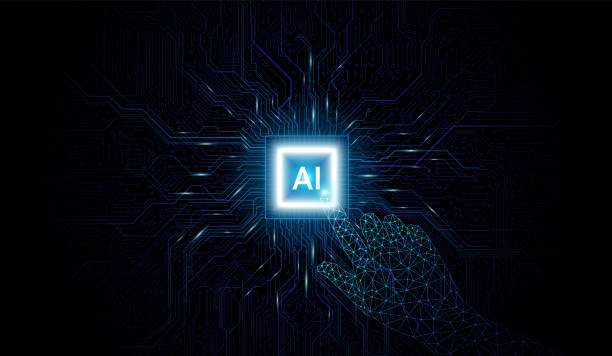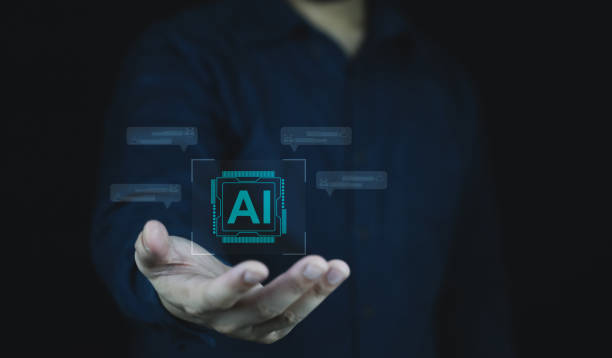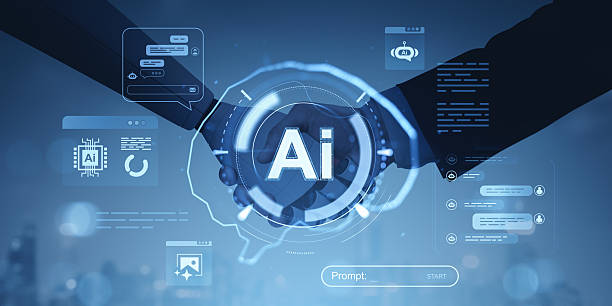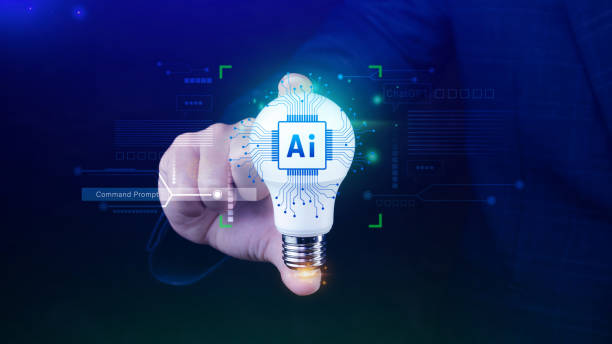What is Artificial Intelligence and How Does it Work?
![]()
#Artificial Intelligence (AI), is a branch of computer science that deals with building machines that can perform tasks that usually require human intelligence.
These tasks include learning, reasoning, problem-solving, language understanding, and pattern recognition.
AI is not just a technology, but a collection of technologies that come together to create intelligent systems.
In general, AI systems acquire the ability to perform specific tasks by receiving data, processing it, and learning from patterns.
AI uses algorithms and various models to enable machines to make decisions and respond to complex issues.
This technology is currently used in many industries and fields and has a significant impact on our lives.
Did you know that customers’ first impression of your company is your website? Multiply the credibility of your business with a powerful corporate site from Rasaweb!
✅ Exclusive and eye-catching design to match your brand
✅ Improve user experience and increase customer acquisition
⚡ Get free advice!
History and Evolution of Artificial Intelligence

The idea of building intelligent machines goes back decades, but AI in today’s sense has its roots in a conference in 1956 at Dartmouth College.
At this conference, leading computer scientists gathered to discuss the possibility of building machines that could think.
In the early decades, AI was met with great enthusiasm, but progress was slow due to hardware and algorithmic limitations.
In the 1980s and 1990s, AI regained attention with the advent of expert systems and neural networks.
But the main turning point was the emergence of Deep Learning in the 2010s.
Using deep neural networks, deep learning has dramatically improved AI performance in areas such as image recognition and natural language processing.
Today, AI is evolving rapidly and is expected to play a much more important role in our lives in the future. For more information, you can visit the History of Artificial Intelligence page.
Types of Artificial Intelligence

Artificial intelligence can be classified based on various criteria.
One of the most common classifications is based on the level of AI ability.
Based on this, AI is divided into three main categories:
Weak AI (Narrow AI) This type of AI is only capable of performing a specific task and can perform better than humans in that task.
Most of today’s AI systems are of this type.
Like facial recognition systems or movie recommendation systems.
Strong AI (General AI) This type of AI is capable of doing anything that a human can do.
In other words, strong AI has general intelligence and can learn and reason in various fields.
Strong AI is still theoretical and there is no real strong AI system.
Super AI This type of AI goes beyond human intelligence and can perform better than humans in all fields.
Super AI is also still theoretical, and many scientists believe that building such a system is very challenging and even dangerous.
In addition to this classification, AI can also be classified based on the learning method.
For example, supervised learning, unsupervised learning, and reinforcement learning are among the common learning methods in AI.
| Type of Artificial Intelligence | Description | Examples |
|---|---|---|
| Weak Artificial Intelligence | Capable of performing a specific task | Face recognition, movie recommender |
| Strong Artificial Intelligence | Able to do anything a human does | (Theoretical) |
| Super Artificial Intelligence | Beyond human intelligence | (Theoretical) |
Applications of Artificial Intelligence in Today’s World

AI is used in many fields today and has affected our lives.
Some of the most important applications of AI are:
Medicine and Health Diagnosis of diseases, development of new drugs, personalization of treatments, surgical robots.
Transportation Self-driving cars, route optimization, traffic management.
Financial Fraud detection, risk management, algorithmic trading.
Education Personalized educational systems, automated homework evaluation, virtual teaching assistants.
Production Industrial robots, quality control, equipment failure prediction.
Customer service Chatbots, answering questions, solving problems.
Security Detection of cyber threats, video surveillance, identification of individuals.
These are just a few examples of AI applications, and as this technology advances, new applications will emerge.
AI applications have increased efficiency, reduced costs, and improved the quality of life.
Are you tired of losing customers due to poor shopping site design? With Rasaweb, solve this problem forever!
✅ Increase sales and visitor-to-customer conversion rate
✅ Smooth and attractive user experience for your customers⚡ Get free advice
What are Machine Learning and Deep Learning?

Machine Learning and Deep Learning are two important sub-branches of AI.
Machine learning allows systems to learn from data without explicit programming.
In other words, machine learning systems, by analyzing data and finding patterns, acquire the ability to perform specific tasks.
Deep learning is a type of machine learning that uses deep neural networks.
Deep neural networks are made up of many layers of neurons and can detect more complex patterns in data.
In recent years, deep learning has made significant advances in areas such as image recognition, natural language processing, and game development.
In general, machine learning and deep learning are powerful tools that allow AI to solve complex problems and perform tasks that were previously impossible for machines.
Machine learning and deep learning play an essential role in the advancement of AI.
Advantages and Disadvantages of Artificial Intelligence

AI has many advantages, but it also has disadvantages that should be considered.
Some of the most important advantages of AI are:
Increased Efficiency AI can perform tasks faster and more accurately than humans.
Cost Reduction AI can reduce labor costs and other costs.
Improved Quality AI can improve the quality of products and services.
Creating Innovation AI can help create new products and services.
Solving Complex Problems AI can solve complex problems that are impossible for humans.
Some of the most important disadvantages of AI are:
High Cost of Development and Deployment Developing and deploying AI systems can be very costly.
Need for a Lot of Data AI systems need a lot of data to learn and function properly.
Ethical Problems AI can create new ethical issues, such as discrimination and privacy.
Potential Job Loss AI can cause job loss, especially in jobs that can be automated.
Security Risks AI can be used by malicious people for malicious purposes.
To use AI responsibly, we must pay attention to its advantages and disadvantages and try to benefit from its advantages and reduce its disadvantages.
Advantages and disadvantages of AI should be carefully considered.
The Future of Artificial Intelligence

The future of AI is very bright and this technology is expected to play a much more important role in our lives in the future.
Some predictions about the future of AI are:
Expansion of AI Applications AI will be used in more fields.
Advances in Machine Learning and Deep Learning Machine learning and deep learning algorithms will become more complex and efficient.
Emergence of Strong AI Strong AI systems will likely be built in the future.
The Impact of AI on the Labor Market AI will have a great impact on the labor market, eliminating some jobs and creating new ones.
New Ethical Issues AI will create new ethical issues that need to be addressed.
To prepare for the future of AI, you must acquire the necessary skills and be constantly learning.
Also, you should pay attention to the ethical issues of AI and strive to use this technology responsibly.
The future of AI can be very exciting, but to benefit from it, you must be prepared.
| Area | Prediction |
|---|---|
| Healthcare | More accurate diagnosis of diseases, personalized medicines |
| Transportation | Expansion of self-driving cars, smart traffic systems |
| Manufacturing | Complete automation of production lines, smart robots |
Ethical Challenges of Artificial Intelligence

As AI advances, new ethical challenges also arise.
Some of the most important ethical challenges of AI are:
Discrimination AI systems may be discriminatory due to the use of biased data.
Privacy AI can be used to collect and analyze people’s personal information and violate their privacy.
Accountability It is difficult to determine responsibility in the event of an error by AI systems.
Control Controlling advanced AI systems may be difficult, and this can pose risks.
Transparency The performance of AI systems must be transparent in order to be trusted.
To solve these ethical challenges, appropriate laws and regulations must be developed and the ethicality of AI must be ensured.
Also, public awareness about ethical issues of AI should be increased.
Ethical challenges of AI need serious attention.
Isn’t your online sales as expected? With Rasaweb, solve the problem of low sales and poor user experience forever!
✅ Increase visitor-to-customer conversion rate
✅ Create a pleasant user experience and increase customer trust
⚡ Take action now to receive free advice!
How to Learn Artificial Intelligence?

Learning AI can be a challenging yet rewarding experience.
To get started, you can use free online resources such as training courses, articles, and videos.
You can also participate in specialized AI training courses.
Some important skills for learning AI are:
Mathematics Knowledge of mathematics, especially linear algebra, differential and integral calculus, and statistics, is essential for understanding AI algorithms.
Programming To implement AI algorithms, you must be familiar with programming languages such as Python.
Machine Learning Understanding machine learning concepts and algorithms is very important for working with AI.
Deep Learning Familiarity with deep neural networks and their training methods is essential for working in more advanced areas of AI.
Problem Solving AI requires solving complex problems, so problem-solving skills are very important.
With effort and perseverance, you can learn AI and succeed in this field.
Learning AI requires constant effort.
Useful Resources and Tools for Artificial Intelligence

To work with AI, you need various resources and tools.
Some useful resources and tools for AI are:
Machine Learning Libraries Libraries such as TensorFlow, PyTorch, and scikit-learn are powerful tools for implementing machine learning and deep learning algorithms.
Data Sets Various data sets exist for training AI systems.
Some famous data sets include MNIST, CIFAR-10, and ImageNet.
Development Environments Development environments such as Jupyter Notebook and Google Colab are suitable tools for developing and testing AI code.
Online Communities Various online communities exist for discussing and exchanging ideas about AI.
Stack Overflow and Reddit are among the famous communities.
Online Training Courses Various online training courses exist for learning AI.
Coursera, edX, and Udacity are among the famous platforms providing online training courses.
Useful AI tools are abundant and help in learning and developing this technology.
Frequently Asked Questions
| Question | Answer |
|---|---|
| 1. What is Artificial Intelligence (AI)? | It is a branch of computer science that aims to create machines capable of simulating human intelligence and performing tasks that require human thinking, such as learning, problem-solving, and decision-making. |
| 2. What are the main types of Artificial Intelligence? | They can be classified into Weak Artificial Intelligence (Narrow AI) that focuses on a specific task, General Artificial Intelligence (General AI) that possesses comprehensive human capabilities, and Super Artificial Intelligence (Super AI) that surpasses human intelligence. |
| 3. Mention some common applications of Artificial Intelligence in our daily lives. | These include voice assistants (such as Siri and Alexa), recommendation systems (such as Netflix and Amazon), self-driving cars, facial recognition systems, and spam filters. |
| 4. What is the difference between Artificial Intelligence and Machine Learning (ML)? | Artificial Intelligence is the broader concept of creating intelligent machines, while Machine Learning is a subset of Artificial Intelligence that focuses on enabling systems to learn from data without explicit programming. |
| 5. What is Deep Learning (DL)? | It is a subset of Machine Learning that uses artificial neural networks with multiple layers (deep neural networks) to process data and discover complex patterns, and it is used in image and speech recognition. |
| 6. What are the most prominent benefits of Artificial Intelligence? | Improving efficiency and productivity, automating repetitive tasks, making better decisions based on big data analysis, and developing solutions to complex problems in fields such as medicine and science. |
| 7. What are the main challenges facing the development and deployment of Artificial Intelligence? | These include the need for massive amounts of high-quality data, privacy and security issues, bias in data and algorithms, and high development and maintenance costs. |
| 8. Does Artificial Intelligence raise ethical or social concerns? | Yes, it raises concerns related to privacy, algorithmic bias, job loss due to automation, and responsibility for errors committed by intelligent systems, and the need for a regulatory framework. |
| 9. How can Artificial Intelligence affect the future of the labor market? | It can lead to the automation of some routine tasks, but it will also create new jobs that require advanced skills in developing, operating, and maintaining Artificial Intelligence systems. |
| 10. What are some modern or promising technologies in the field of Artificial Intelligence? | These include advanced Natural Language Processing (NLP) (such as large language models like ChatGPT), computer vision, robotics, and Generative Artificial Intelligence (Generative AI). |
And other services of Rasa Web Advertising Agency in the field of advertising
Intelligent Social Media: Professional optimization to increase sales using Google Ads management.
Intelligent Google Ads: A new service to increase campaign management through precise audience targeting.
Intelligent Data Analysis: A new service to increase SEO ranking improvement through attractive user interface design.
Intelligent Content Strategy: Professional optimization for campaign management using attractive user interface design.
Intelligent Link Building: Designed for businesses looking to manage campaigns through Google Ads management.
And more than hundreds of other services in the field of internet advertising, advertising consulting, and organizational solutions
Internet Advertising | Advertising Strategy | Advertorial
Resources
What is Artificial Intelligence? Applications and What it is in Our Lives
,What is Artificial Intelligence? Everything you need to know about AI
,Ethical Issues of Artificial Intelligence are being Reviewed
,What is Artificial Intelligence? Review of the Advantages and Disadvantages of Artificial Intelligence
? Rasaweb Digital Marketing Agency is your strategic partner on the path to online brilliance and sustainable business growth. Keep your brand at its peak with our professional services in the field of SEO-optimized website design and digital marketing.
📍 Tehran, Mirdamad Street, next to the Central Bank, South Kazerun Alley, Ramin Alley No. 6
“`




